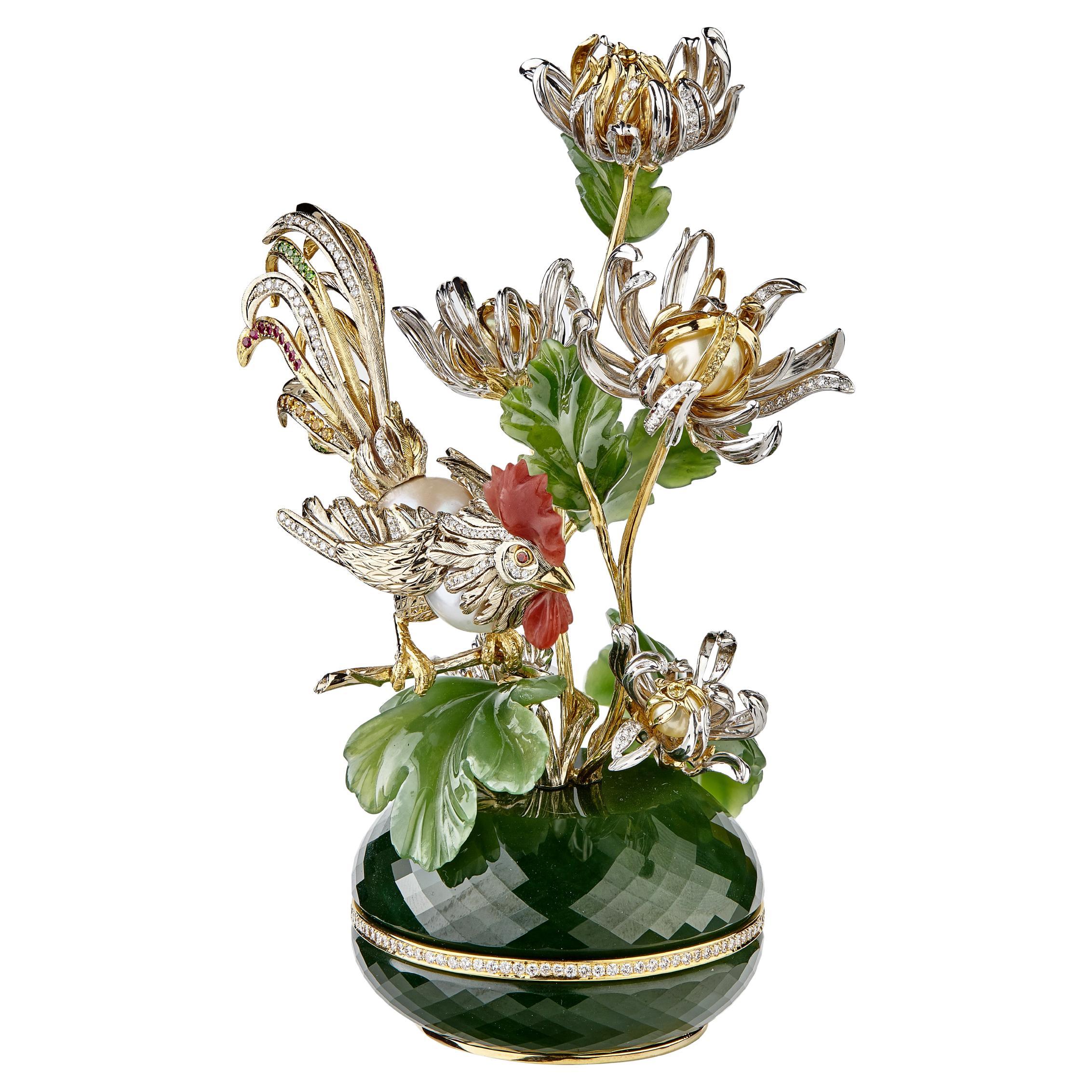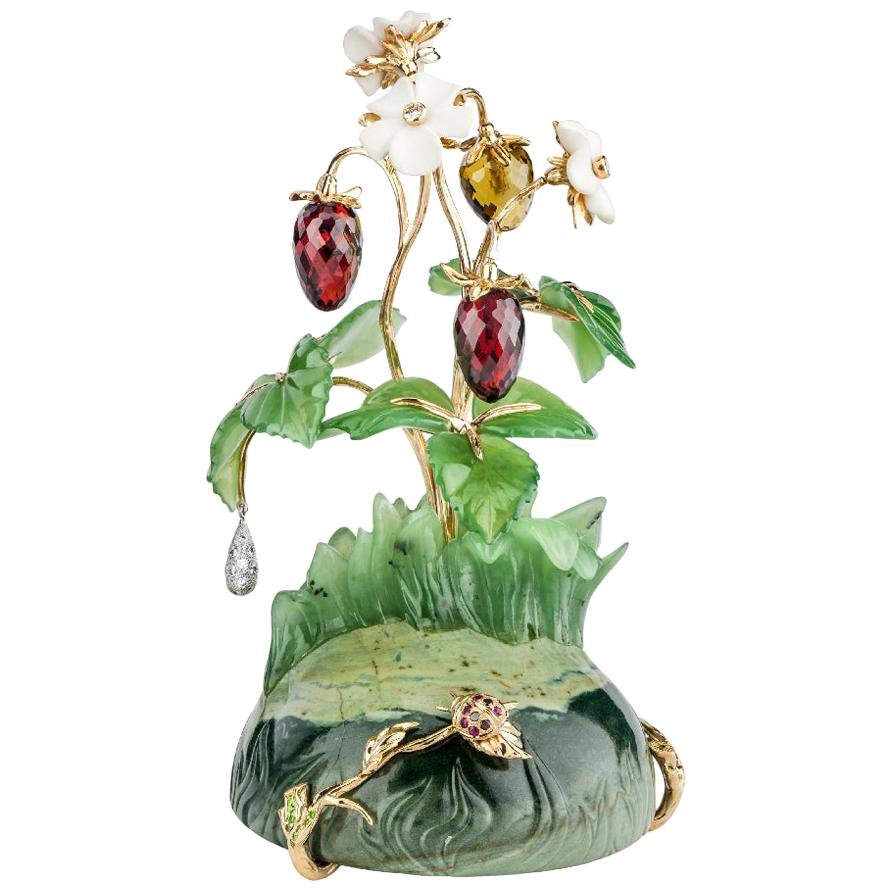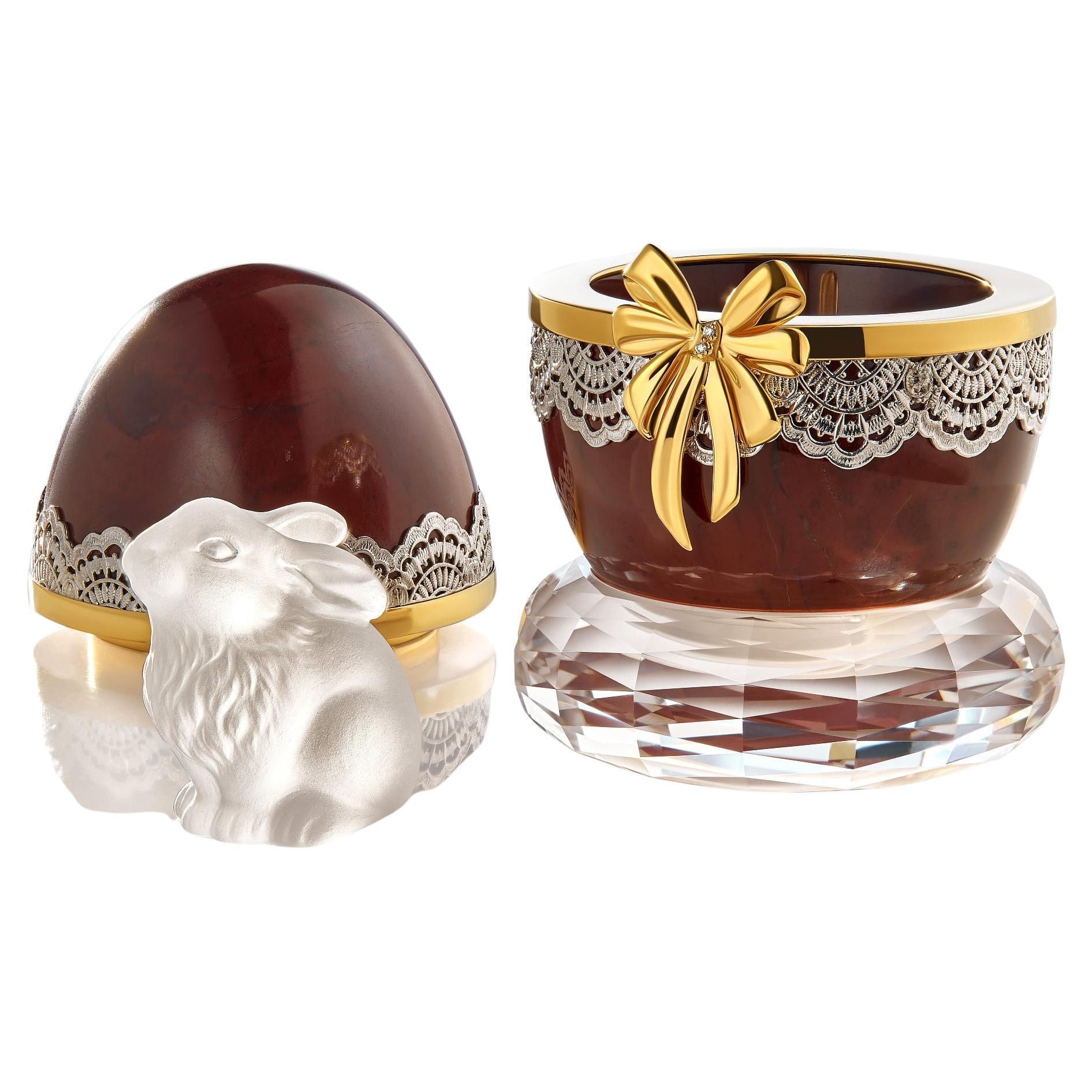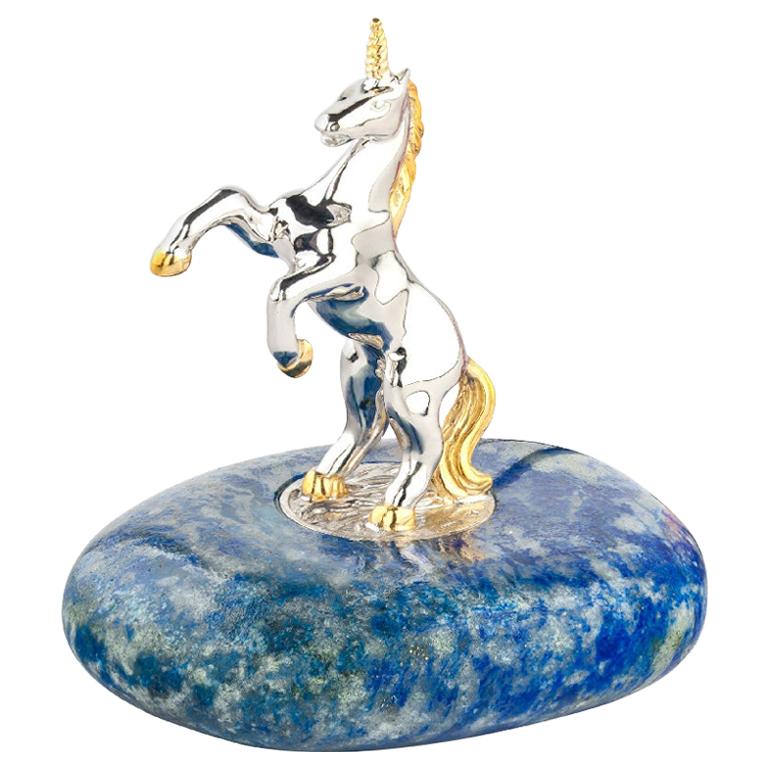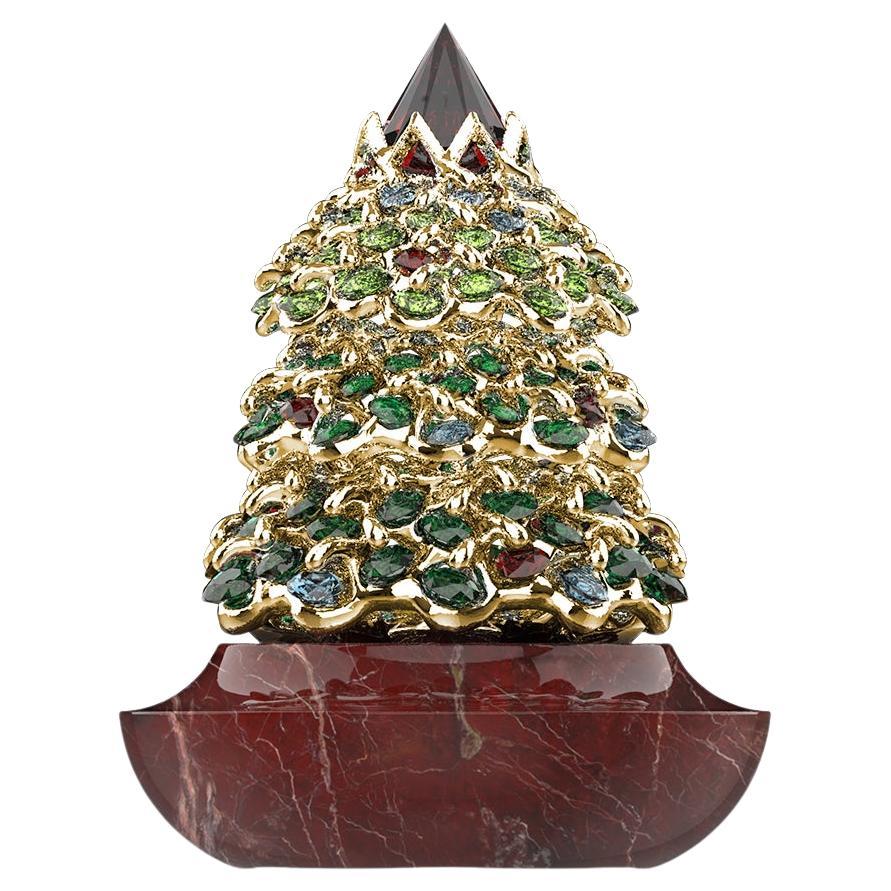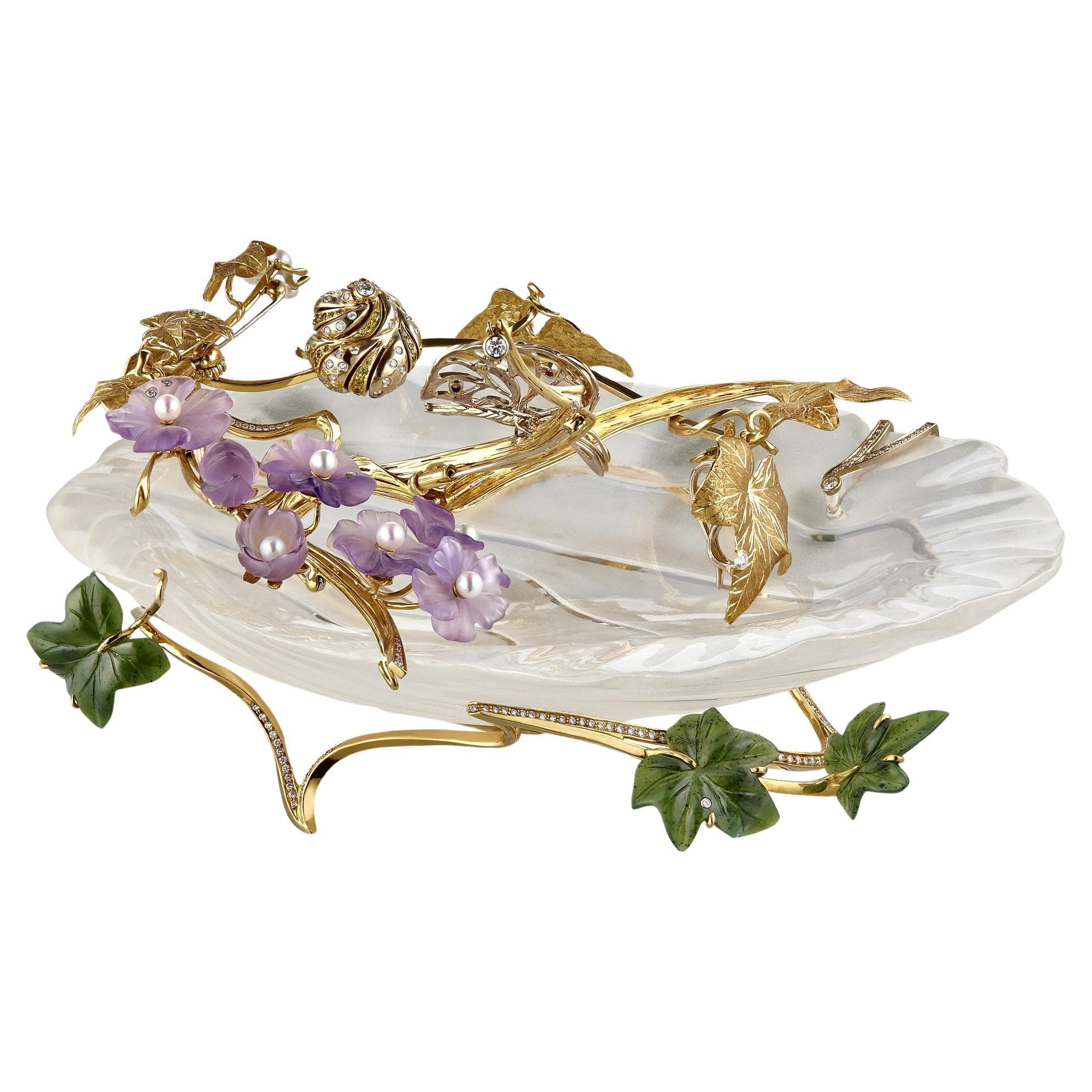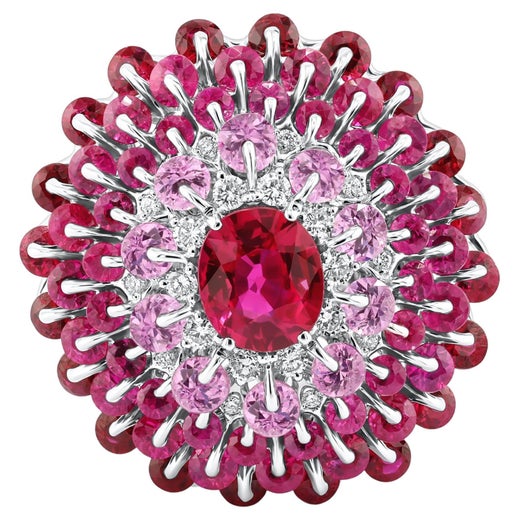Items Similar to 18 Karat Gold Silver Diamond Floral carving Miniature by MOISEIKIN
Video Loading
Want more images or videos?
Request additional images or videos from the seller
1 of 9
18 Karat Gold Silver Diamond Floral carving Miniature by MOISEIKIN
About the Item
Gold floral compositions with precious or semi-precious stones or enamel became popular at the turn of the 20th century in Europe and Russia. Especially Imperial families and nobilities collected or gifted to important people.
This floral miniature consisted of various rich flower stone carvings adorned with gold filigrees and over 9ct white and black diamonds is fascinating.
Poppy flowers made of chalcedony and black diamonds adjoin a quartz lily and lively golden chrysanthemum decorated with diamonds. The gold stamens are adorned with diamonds and sapphires. Fresh-looking leaves are also hand-carved from Siberian nephrite to balance this rich floral composition. One of the poppies is detachable to be transformed into an outstanding brooch. A deep nephrite vase harmoniously continues the floral theme: inspired by the image of an ancient wine cup, it is shaped to be reminiscent of a flower bud. The artistic floral pattern on the base is silver and embedded with diamonds.
This intricate artistic floral object symbolising tenderness, love, and wealth, shall bring joy to the home and be a precious family treasure for future generations.
"Floral Fancy" Gold 18 K / SV925, Weight 613.18 g,
Size: 105*103*246mm
1 184 Diamond 7,323 ct
72 Black Diamond 2,16 ct
1 Garnet 0,065 ct
1 Smoky Quartz 1,5 ct
1 Pearl 0,24 g
3 Carving quartz 20,8 g
1 Nephrite 342,6 g
11 Carving nephrite 48,51 g
4 Sapphire 1,08 ct
4 Chalcedony 38,52 g
*This objet d'art was made in 2008 but not owned by anyone before. This object has been exhibited at a number of exhibitions such as Russian, Eastern & Oriental Fine Art Fair in London and presented to HRH Prince Michael of Kent. It also became a highlight of Flower Festival in Grasse, France. Our handmade wooden box and brand certificate will be accompanied.
* Please allow some days for light cleaning, careful packing, and required documentation for the art piece.
* Please feel comfortable to ask any question and offer your price. We are open for negotiation.
- Creator:
- Metal:
- Stone:
- Stone Cut:
- Weight:613 g
- Dimensions:Height: 9.69 in (246 mm)Width: 4.14 in (105 mm)Depth: 4.06 in (103 mm)
- Style:
- Place of Origin:
- Period:
- Date of Manufacture:2008
- Condition:
- Seller Location:Hong Kong, HK
- Reference Number:Seller: 74924001stDibs: LU1562218036942
Moiseikin International Ltd
Established in 1993, Viktor Moiseikin has been one of the most gifted interior and jewellery designers. With a unique background as an engineer, artist and jeweller, Viktor strives to achieve flawless quality and state-of-the-art designs and technologies that commands attention, builds emotion, includes a surprising secret element, while reviving old time prosperous era. Viktor Moiseikin’s talent in accomplishing such a monumental task successfully in gemstone and jewellery is astounding. His thoughtfulness, excellent workmanship and imaginative designs quickly launched his stellar career and earned him international acclaim.
He devotes his engineering ingenuity to introduce innovative techniques to create original and artistic pieces that are not only stunning to wear but works of art to admire.
About the Seller
4.8
Vetted Seller
These experienced sellers undergo a comprehensive evaluation by our team of in-house experts.
Established in 2012
1stDibs seller since 2019
18 sales on 1stDibs
Typical response time: 1 hour
- ShippingRetrieving quote...Ships From: Hong Kong, Hong Kong
- Return PolicyThis item cannot be returned.
More From This SellerView All
- MOISEIKIN 18K Gold Diamond and Pearl Floral MiniatureBy MOISEIKINLocated in Hong Kong, HKAn exquisite floral miniature with chrysanthemums and a golden rooster was created inspired by the Eastern Asian Painting "Flowers and Birds." Chrysan...Category
2010s Russian Arts and Crafts Figurines and Sculptures
MaterialsDiamond, Garnet, Jade, Pearl, Ruby, Blue Sapphire, Chalcedony, 18k Gold
- 18 Karat Gold Flower Miniature Precious Berries by MOISEIKINBy MOISEIKINLocated in Hong Kong, HKGold floral compositions with precious or semi-precious stones or enamel became popular at the turn of the 20th century in Europe and Russia. Especially Imperial families and nobilities collected or gifted to important people. The flowers are carved from cacholong —Russian milky opals — look so tender and natural. Berries are skillfully cut from citrine and garnets. Golden stems are carved lively and embedded with rare Ural demantoid garnets. Fresh nephrite leaves are carved by hands. The intricate dewdrop is intricate.. embedded with diamonds. On a green jasper ground, a lucky ladybug made of gold, rubies and black diamonds is enjoying the moment. Perfectly expressed in the precious metal and stones by skillful craftsmen of MOISEIKIN®, the pleasant memory will not fade away. This flower miniature is one of Precious Berry Collections and another piece is possessed by a known royalty who collects flower...Category
21st Century and Contemporary Russian Contemporary Figurines and Sculptures
MaterialsCitrine, Diamond, Garnet, Jade, 18k Gold
- MOISEIKIN Silver Gold Plated Rabbit Easter Egg MiniatureBy MOISEIKINLocated in Hong Kong, HKMOISEIKIN's stunning Silver Gold-Plated Easter Egg is an inspiring and enchanting miniature to prepare for this year's Easter Holiday. This ornate Easter Egg is carefully carved ou...Category
2010s Thai Contemporary Figurines and Sculptures
MaterialsDiamond, Quartz, Jasper, Gold Plate, Silver
- 18 Karat Gold Unicorn Miniature on Lazurite Magnetic Stone, MOISEIKINBy MOISEIKINLocated in Hong Kong, HKThe legendary unicorn embodies toleration, dignity, care and purity. This gift is a wish for longevity and enlightenment. MOISEIKIN® embodied the images of energetic, tough and freedom loving horse on the precious metal and lazurite which was considered symbolic to success and bright ability . Specialised in carving technique, the body of unicorn is detailed. The pebble shape lazurite contains special magnet which attracts some coins such as Rubles, Yuan, Dirham, Singapore Dollars as well as desk stationary -clips while helping enhancing the natural stone power. Unicorn miniature will become a real talisman that attracts good fortune throughout the year. 18K Gold Unicorn Miniature "Source of Inspiration" Gross weight 115g Size: W57mm x D45mm x H 60mm Lazurite 81.27g accompanied with a handmade wooden box If you are interested in miniature collections...Category
21st Century and Contemporary Russian Contemporary Figurines and Sculptures
MaterialsLapis Lazuli, Gold, 18k Gold
- MOISEIKIN SV Gold Plated Jewel Chrsitmas Tree MiniatureBy MOISEIKINLocated in Hong Kong, HKMOISEIKIN's Jewel Christmas Tree—a mesmerizing celebration crafted for the season of joy. This exquisite tree, silver gold-plated to perfection, stands as a refined desk accessory ad...Category
2010s Thai Contemporary Figurines and Sculptures
MaterialsGarnet, Peridot, Tsavorite, Blue Topaz, Jasper, Gold Plate, Silver
- 18K Gold transforming jewellery Interior Object by Viktor MoiseikinLocated in Hong Kong, HKAll in this world is a reflection Of divine love and eternal art. And we're seeking inspiration, In the feelings – strings of soul harps. -Viktor Moiseikin - The 'Serenity' interior decoration by MOISEIKIN is a beautiful combination of modern and traditional jewellery art. The large carved quartz jewel plate, in which you can place your jewellery, represents the water where the natural lives concentrate. Delicately carved Clematis leaves made of jade and gold gently as if embracing precious pure water. The golden fluttering butterfly and snail are embedded with precious gems that bring charm. One beautiful and shining moment of nature is precisely and artistically reflected in this gold and jewellery artwork...Category
2010s Thai Artisan Figurines and Sculptures
MaterialsJade, Sapphire, Quartz, Cultured Pearl, Garnet, Diamond, Amethyst, Yello...
You May Also Like
- Mellerio Paris, a French Gold, Diamonds, Silver, and Smoky Quartz Carved HorseBy Mellerio dits MellerLocated in New York, NYMellerio Paris, A French Gold, Diamonds, Silver-Gilt, Rock-Crystal, Jade, Mother-Of-Pearl and Smoky Quartz, Carved Horse Sculpture, Jeweled Mounted Object. An extremely rare and unique, one of a kind French gold, diamonds, Silver-gilt, rock-crystal, jade, obsidian, mother-of-pearl, and smoky quartz carved jeweled sculpture "CHEVAUX DE LEGENDE", "A Legendary Horse" by Mellerio, Paris, circa 1991. Sitting on black obsidian base, the solid rock-crystal slab is finely applied with a carved smoky -quartz and jade horse with a harness mounted in 18k gold, brilliant -cut diamonds, rubies, turquoise, and amethyst chains and pendants. The top columns adorned with 18k gold and brilliant cut diamond pendants, the bottom with gold and mother of pearl plaques. The obsidian base with a plaque engraved: CHEVAUX DE LEGENDE" / N° 05 / MELLERIO DITS MELLER / PARIS / 5003 D The piece is in excellent condition and comes with a custom made wood case made for transport. It's very elegant and has French hallmarks throughout. A truly magnificent piece. Measures 10.5" high x 8.5" wide x 4" deep Founded in France in 1613 by the descendants of Italian immigrants from the Vigezzo Valley in the north of Italy, Mellerio is one of the oldest jewellery houses in Europe. The family business soon attracted the attention of the Royal Court and Marie Antoinette herself reportedly purchased a precious bracelet featuring 7 cameos surrounded by rubies in 1780. Later on, in the 19th century, Mellerio became the official supplier of the French Royal family and the Court of Netherland. Mellerio creates many jewellery items, all set with rare gems such as peridots, amethysts, aquamarines, citrines and topaz, applying for a patent, the flexible stem, a very supple and light jewellery mechanism. Mellerio remains also well known for their spectacular series of Art Nouveau jewels, created at the beginning of the 20th century, as well as for the creation of trophies rewarding some of the greatest footfall and tennis players of history. In 1993, the jewellery house launched their first watch collection. Today, Mellerio has stores in Paris, Japan and Hong Kong. July 14, 1789: this date is known throughout the world as the beginning of the French Revolution. According to a ledger belonging to House of Mellerio, this was also the day that the jeweler sold a golden key to the Comte de Coutance for 10 livres. This ledger, as well as inventories dating as far back as 1768, are the jeweler’s oldest archives. These archives have continued to grow over the years, as the House, established on rue de la Paix in Paris, still lives on today, still in the hands of the same family from Craveggia, in the North of Italy. The tumultuous history of the Mellerio family in France probably goes as far back as the Italian wars of the Renaissance, but the first official document proving their commercial activity in Paris dates back to 1613. This document is the famous royal warrant awarded by Marie de Medici to a number of Italian families established along the rue des Lombards, including the Mellerios, allowing them to sell “small jewelery items”, therefore granting them a small exception to the traditional monopoly enjoyed by Parisian jewelers. At that time, powerful corporations regulated the operations and customs of Parisian business, but thanks to this exceptional warrant, the Mellerios managed to escape the confines of this framework. Today, this wax-sealed document is kept at the city hall of Craveggia. From 1613 to the Revolution, the Mellerios lived between France and Italy. The corporations tried many times to put an end to their trade privileges, but all in vain, as a dynasty of sovereigns renewed the warrant. Always marrying and often retiring in Craveggia, the Mellerios continued to maintain their jewelry business in Paris. At first, they did this without a shop. Wearing backpacks (wooden boxes divided into small compartments where jewels were kept), they would tour town fairs around Paris and royal castles. This is how Jean-Baptiste Mellerio (1765-1850) is said to have sold a bracelet set with rubies and Antique cameos to Marie-Antoinette, which still exists today. Many elements seem to prove the veracity of this anecdote. The queen was particularly fond of cameos, which cover the entire background of her famous jewelry cabinet, and ruby was her favorite stone after diamond. The famous bracelet, reacquired a few years ago by the House of Mellerio, is indeed an 18th century jewel, set with antique cameos representing the profiles of Roman emperors. Two branches of the family were operating in Paris during this time, under the reign of Louis XVI: that of Jean-François (1746-1828), the paternal ancestor of the current Mellerios, and that of Jean-Baptiste (1765-1850). The French Revolution forced them to return to Italy. However, both Jean-Baptiste and François Mellerio (1772-1843), who was the son of Jean-François, were eventually able to return to Paris after the founding of the Consulate. Jean-Baptiste opened a shop at the Iron Crown of rue Vivienne, and François opened his at the Palais des Tuileries, rue du Coq Saint-Honoré. His well-organized order books give an idea of his high-ranking clientele during the “Old Regime”, among which were the Comte and Comtesse Octave de Segur, the Marquise (later Duchess) de Tourzel, former governess of the royal children, and her daughter, the Comtesse de Bearn, the Craufurds -who organized the flight to Varennes, the Duc and Duchess de Gramont, the Comtesse de Boigne, and Madame de Souza, Talleyrand’s mistress. We also see the names of the imperial family: Empress Josephine, the Queen of Holland, Princess Elisa, Caroline and Pauline. At that time, the House of Mellerio specialized, among other things, in the trade of antique cameos, a newly fashionable genre of jewel that captured the imagination of all the princesses and noble women of the time. The years of the Restauration and July Monarchy were among the most glorious. The Bourbons were back on the throne, and the clientele of the House of Mellerio had regained its former wealth. Mellerio supplied Louis-Philippe, Duke of Orléans, as well as his mother, wife and sister, with sumptuous jewels, including a set of emeralds made piece by piece, while the Duke of Bourbon, last prince of the House of Condé, offered diamonds to his mistress, the scheming Baronne de Feucheres, and Monsieur de LaFayette also bought cameos for one of his granddaughters. For the first time, Mellerio ventured into the world of arts in 1815, when Carlotta Grisi, a famous dancer who created Giselle, as well as an actress named Rachel, bought jewels at the Mellerio store on rue de la Paix. 1848 marked a new turning point. France once again became a Republic. François Mellerio handed the company over to his son, Jean, and the latter decided to travel to Spain to build a new clientele. He later became one of the jewelers of the royal family, and met Eugénie de Montijo, who remained a faithful client when she became empress of the French people. The Imperial years were lavish. During the Second Empire, Paris was a pageant of crinoline dresses designed by Worth, while jewels by Mellerio, Worth’s neighbour on the rue de la Paix, adorned the noble women of the Tuileries court. The Empress bought pearls. Mathilde Bonaparte...Category
20th Century French Figurines and Sculptures
MaterialsJade, Quartz, Rock Crystal, Ruby, Turquoise, Amethyst, Diamond, Gold, Si...
- Mellerio Paris, a French Gold, Diamond, Silver-Gilt, Rock-Crystal, & Lapis HorseBy Mellerio ParisLocated in New York, NYMellerio Paris, A French Gold, Diamond, Silver-Gilt, Rock-Crystal, Obsidian & Lapis Horse An extremely rare and unique, one of a kind French gold, diamonds, Silver-gilt rock-crystal, obsidian and lapis lazuli jeweled sculpture "Bucéphale, Chevaux de légende", "Bucephalus, A Legendary Horse" by Mellerio, Paris, circa 1998. Sitting on black obsidian base, the solid rock crystal slab is finely applied with a lapis lazuli half-horse with harness mounted in 18k gold and brilliant cut diamonds, between two crystal and lapis lazuli columns adorned with gold and diamonds, insert with 7 ruby cabochons and 1 emerald cabochon, the obsidian base with a plaque engraved: CHEVAUX DE LEGENDE / MELLERIO DITS MELLER / PARIS / 5029 DIV Bucephalus (c355-326 BC) is among the most famous horses in history, and it was said that this he could not be tamed. The young Alexander the Great, of course, tamed him – and went on to ride his beloved equine companion for many years and into many battles. The piece is in excellent condition and comes with a custom made wood case made for transport. It's very elegant and has French hallmarks throughout. A truly magnificent piece. Measures 10" high x 9" wide x 4" deep Founded in France in 1613 by the descendants of Italian immigrants from the Vigezzo Valley in the north of Italy, Mellerio is one of the oldest jewellery houses in Europe. The family business soon attracted the attention of the Royal Court and Marie Antoinette herself reportedly purchased a precious bracelet featuring 7 cameos surrounded by rubies in 1780. Later on, in the 19th century, Mellerio became the official supplier of the French Royal family and the Court of Netherland. Mellerio creates many jewellery items, all set with rare gems such as peridots, amethysts, aquamarines, citrines and topaz, applying for a patent, the flexible stem, a very supple and light jewellery mechanism. Mellerio remains also well known for their spectacular series of Art Nouveau jewels, created at the beginning of the 20th century, as well as for the creation of trophies rewarding some of the greatest footfall and tennis players of history. In 1993, the jewellery house launched their first watch collection. Today, Mellerio has stores in Paris, Japan and Hong Kong. July 14, 1789: this date is known throughout the world as the beginning of the French Revolution. According to a ledger belonging to House of Mellerio, this was also the day that the jeweler sold a golden key to the Comte de Coutance for 10 livres. This ledger, as well as inventories dating as far back as 1768, are the jeweler’s oldest archives. These archives have continued to grow over the years, as the House, established on rue de la Paix in Paris, still lives on today, still in the hands of the same family from Craveggia, in the North of Italy. The tumultuous history of the Mellerio family in France probably goes as far back as the Italian wars of the Renaissance, but the first official document proving their commercial activity in Paris dates back to 1613. This document is the famous royal warrant awarded by Marie de Medici to a number of Italian families established along the rue des Lombards, including the Mellerios, allowing them to sell “small jewelery items”, therefore granting them a small exception to the traditional monopoly enjoyed by Parisian jewelers. At that time, powerful corporations regulated the operations and customs of Parisian business, but thanks to this exceptional warrant, the Mellerios managed to escape the confines of this framework. Today, this wax-sealed document is kept at the city hall of Craveggia. From 1613 to the Revolution, the Mellerios lived between France and Italy. The corporations tried many times to put an end to their trade privileges, but all in vain, as a dynasty of sovereigns renewed the warrant. Always marrying and often retiring in Craveggia, the Mellerios continued to maintain their jewelry business in Paris. At first, they did this without a shop. Wearing backpacks (wooden boxes divided into small compartments where jewels were kept), they would tour town fairs around Paris and royal castles. This is how Jean-Baptiste Mellerio (1765-1850) is said to have sold a bracelet set with rubies and Antique cameos to Marie-Antoinette, which still exists today. Many elements seem to prove the veracity of this anecdote. The queen was particularly fond of cameos, which cover the entire background of her famous jewelry cabinet, and ruby was her favorite stone after diamond. The famous bracelet, reacquired a few years ago by the House of Mellerio, is indeed an 18th century jewel, set with antique cameos representing the profiles of Roman emperors. Two branches of the family were operating in Paris during this time, under the reign of Louis XVI: that of Jean-François (1746-1828), the paternal ancestor of the current Mellerios, and that of Jean-Baptiste (1765-1850). The French Revolution forced them to return to Italy. However, both Jean-Baptiste and François Mellerio (1772-1843), who was the son of Jean-François, were eventually able to return to Paris after the founding of the Consulate. Jean-Baptiste opened a shop at the Iron Crown of rue Vivienne, and François opened his at the Palais des Tuileries, rue du Coq Saint-Honoré. His well-organized order books give an idea of his high-ranking clientele during the “Old Regime”, among which were the Comte and Comtesse Octave de Segur, the Marquise (later Duchess) de Tourzel, former governess of the royal children, and her daughter, the Comtesse de Bearn, the Craufurds -who organized the flight to Varennes, the Duc and Duchess de Gramont, the Comtesse de Boigne, and Madame de Souza, Talleyrand’s mistress. We also see the names of the imperial family: Empress Josephine, the Queen of Holland, Princess Elisa, Caroline and Pauline. At that time, the House of Mellerio specialized, among other things, in the trade of antique cameos, a newly fashionable genre of jewel that captured the imagination of all the princesses and noble women of the time. The years of the Restauration and July Monarchy were among the most glorious. The Bourbons were back on the throne, and the clientele of the House of Mellerio had regained its former wealth. Mellerio supplied Louis-Philippe, Duke of Orléans, as well as his mother, wife and sister, with sumptuous jewels, including a set of emeralds made piece by piece, while the Duke of Bourbon, last prince of the House of Condé, offered diamonds to his mistress, the scheming Baronne de Feucheres, and Monsieur de LaFayette also bought cameos for one of his granddaughters. For the first time, Mellerio ventured into the world of arts in 1815, when Carlotta Grisi, a famous dancer who created Giselle, as well as an actress named Rachel, bought jewels at the Mellerio store on rue de la Paix. 1848 marked a new turning point. France once again became a Republic. François Mellerio handed the company over to his son, Jean, and the latter decided to travel to Spain to build a new clientele. He later became one of the jewelers of the royal family, and met Eugénie de Montijo, who remained a faithful client when she became empress of the French people. The Imperial years were lavish. During the Second Empire, Paris was a pageant of crinoline dresses designed by Worth, while jewels by Mellerio, Worth’s neighbour on the rue de la Paix, adorned the noble women of the Tuileries court. The Empress bought pearls. Mathilde Bonaparte...Category
21st Century and Contemporary French Figurines and Sculptures
MaterialsDiamond, Lapis Lazuli, Rock Crystal, Gold, Silver
- Sculptural Handcrafted Mermaid Knife, 18k Rose Gold, Layered Damast, DiamondsLocated in Hamburg, DEMasterfully Handcrafted Mermaid Collectors Knife "Galea" is a sight to behold. -Figure handmade of 18K rose gold -Damast folding blade -Handset with 453 blue Sapphires 6ct...Category
21st Century and Contemporary German Modern Figurines and Sculptures
MaterialsDiamond, Sapphire, 18k Gold, Rose Gold
- Certified Natural Nephrite Jade Carving, True Mutton Fat Jade, Bodhidharma, 達摩Located in Hong Kong, HKFrom our extensive Jade collection......This master piece is certified natural nephrite jade "Mutton Fat Jade" The certificate is from a renown Hong Ko...Category
2010s Chinese Contemporary Figurines and Sculptures
MaterialsJade
- 18K Gold, Diamonds, Amethyst, Tourmaline, Bloodstone, and Jasper Toucan BirdBy Gianfranco FrattiniLocated in New York, NYAn 18K gold, diamonds, amethyst, tourmaline, bloodstone, carved emerald, opal and jasper toucan bird resting on a gold tree branch, mounted on a carved malachite base. A very rare and unique gold-mounted jeweled object...Category
20th Century Italian Figurines and Sculptures
MaterialsAmethyst, Diamond, Tourmaline, Jasper, 18k Gold
- Rare 18K Gold, Enamel and Diamond Mounted Carved Labradorite Turkey BirdLocated in New York, NYA rare 18K gold, enamel and diamond mounted carved labradorite turkey bird sculpture on a petrified wood base, attributed to Manfred Wild, Idar-Oberstein, ...Category
20th Century German Figurines and Sculptures
MaterialsDiamond, Labradorite, 18k Gold, Enamel
Recently Viewed
View AllMore Ways To Browse
Imperial Pearl
Flower And Pearl Sculpture
Jade Pearl Brooch
Vase Brooch
18 Ct Gold Object
Wine Garnet
Nephrite Brooch
Wooden Carved Jewelry Box
Russian Enamel Brooch
18 K Gold And Garnet
Diamond Lily Gold Brooch
Lily Flower Brooch
Silver Filigree Brooch
Golden Pearl Diamonds Brooch
4 Stone Sapphire Filigree
Hand Carved Wooden Jewelry Box
Carved Quartz Brooch
Sapphire Lily
